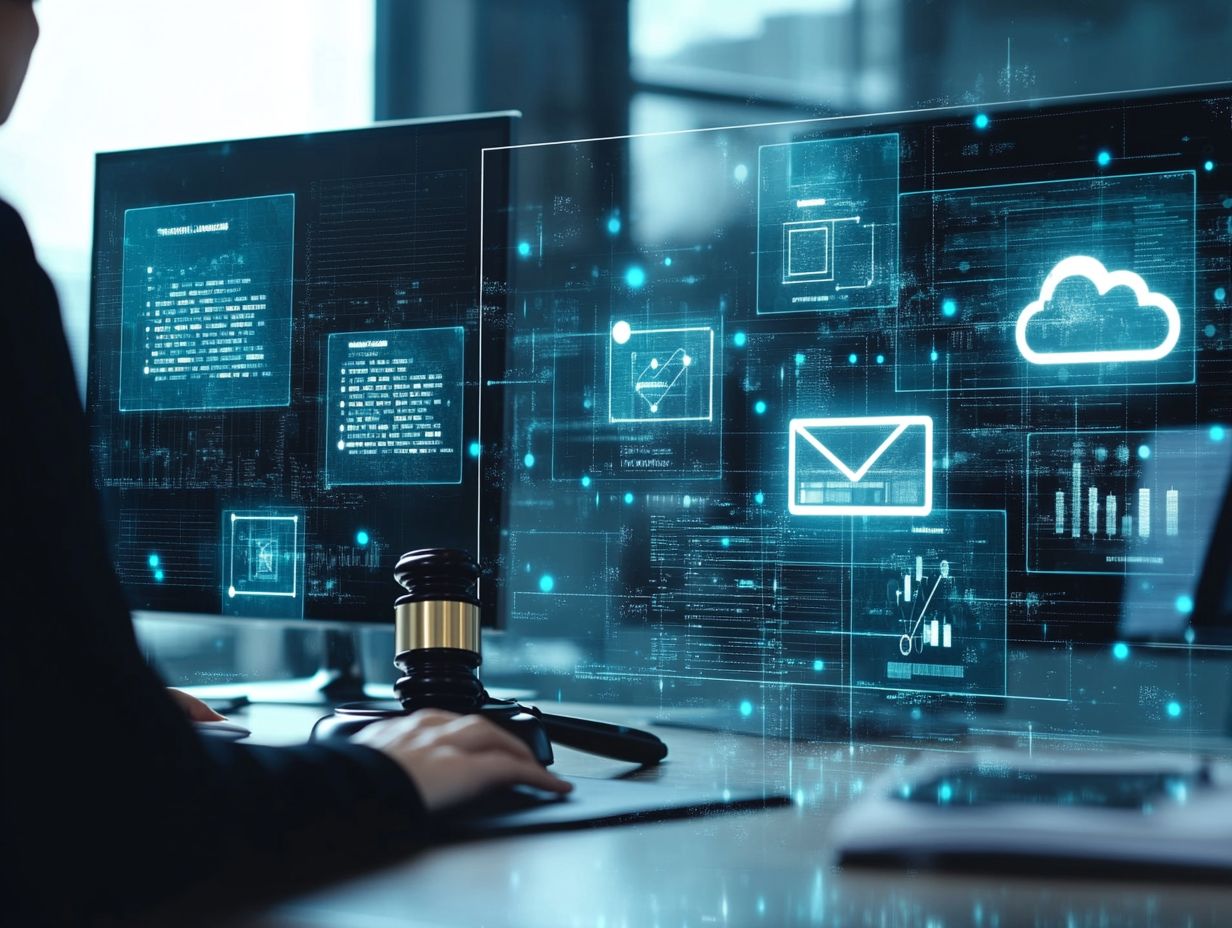The Impact of Digital Transformation on IP Litigation
In today s swiftly changing digital landscape, the intersection of technology and intellectual property (IP) litigation is redefining the legal field. Grasping the implications of digital transformation for IP litigation is essential.
This article delves into digital transformation, shedding light on the pivotal role technology plays in legal processes, as well as the challenges and opportunities that emerge.
It highlights landmark cases that exemplify these shifts and offers insights into the future of IP litigation in this digital era. Embark on this enlightening journey as you explore these transformative dynamics.
Contents
- Key Takeaways:
- Understanding Digital Transformation
- The Role of Technology in IP Litigation
- Challenges and Opportunities
- Key Cases and Precedents
- Future Trends and Predictions
- Frequently Asked Questions
- What is the impact of digital transformation on IP litigation?
- How has digital transformation changed the way IP cases are handled?
- What are some challenges caused by digital transformation in IP litigation?
- How has digital transformation affected the role of IP attorneys in litigation?
- What are some benefits of digital transformation in IP litigation?
- How can companies adapt to the impact of digital transformation on IP litigation?
Key Takeaways:

Digital transformation is the integration of technology into all areas of business, significantly impacting IP litigation. The role of technology in modern IP litigation is changing legal processes, leading to both challenges and opportunities for lawyers and their clients. Adapting to changing technology is crucial for success in IP litigation, as it can provide potential benefits and improve efficiency in legal processes.
Understanding Digital Transformation
Digital transformation represents a significant change in how organizations operate, leverage technology, and interact with stakeholders, particularly in the realm of intellectual property (IP) law and management, including the influence of social issues on IP litigation.
This transformation goes beyond merely adopting new technologies; it influences various aspects, from content distribution to safeguarding IP within online platforms, greatly affecting creators and IP holders alike.
Definition and Key Concepts
Digital transformation embodies the seamless integration of digital technology across every facet of your business, fundamentally reshaping how you operate and deliver value in IP law and rights.
This shift boosts operational efficiencies and redefines how you engage with consumers in the digital economy. By leveraging data analytics, cloud computing, and mobile technologies, you can uncover insights that fuel creative innovation.
However, this evolution brings its own challenges. As you embrace new technologies, you ll encounter complex issues related to copyright and intellectual property rights, often grappling with questions about ownership and protection of digital assets.
The Role of Technology in IP Litigation
The role of technology in IP litigation has expanded dramatically, shaping not only the methods of enforcement but also the strategies employed by IP advisors and legal professionals. For a deeper understanding, explore the role of data in IP litigation decisions when tackling online infringement.
This technological evolution has transformed the landscape, compelling professionals to adapt and innovate in protecting intellectual property in a digital world.
Impact on Legal Processes
Advancements in technology have dramatically reshaped legal processes, especially in intellectual property protection. You must tackle digital piracy head-on and navigate the challenges posed by online platforms.
These advancements have altered how intellectual property is created, shared, and enforced within a digital landscape filled with risks.
Consider the rise of streaming services and file-sharing websites; they complicate efforts to combat the unauthorized distribution of creative works. Platforms like YouTube and various social media networks often find themselves under scrutiny for hosting infringing content, resulting in intricate legal battles over liability.
Legal frameworks are constantly evolving. The ongoing debate around fair use underscores the urgent need for robust digital rights protection mechanisms in this rapidly changing environment.
Challenges and Opportunities
In this ever-evolving digital landscape, you face a multitude of IP challenges while uncovering new opportunities for growth and adaptation.
By leveraging innovative solutions and forming collaboration agreements, you can navigate this complex terrain with confidence and agility.
Staying updated on these changes is crucial for legal professionals. Adapting to digital transformation will open new doors for success in IP litigation.
To explore more resources or connect with professionals in the field, consider reaching out for further engagement.
Adapting to Changing Technology

Adapting to changing technology is essential for your organization. It helps you navigate the complexities of the digital economy and keeps your intellectual property (IP) strategies effective amidst evolving risks.
To achieve this, prioritize continuous monitoring of your intellectual property rights. Advanced digital tools will simplify your IP management and enhance your ability to track potential infringements in real-time.
Utilizing software for IP analytics provides invaluable insights into your competitive landscape. This enables you to make informed decisions swiftly.
Fostering a culture of innovation is crucial. Embracing new technologies leads to robust strategies that protect your assets and encourage collaboration across departments.
These adaptive measures position your organization to stay ahead in a fast-paced environment.
Potential Benefits for IP Litigation
Incorporating innovative technologies into IP litigation offers substantial benefits. It enhances legal efficiencies and improves the enforcement of digital rights for IP holders.
By streamlining case management, these technologies help organize documents effectively. They also facilitate quicker communication between all parties involved.
With advanced analytics, you can predict outcomes based on past cases. This enables you to make well-informed decisions.
Automation tools minimize repetitive tasks. This gives you precious time to focus on strategy and argument development.
Integrating artificial intelligence allows you to identify potential infringements through real-time monitoring. This empowers you to act swiftly when necessary.
Ultimately, these advancements accelerate the pace of litigation and ensure a fairer, more transparent process for those protecting their intellectual property.
Key Cases and Precedents
Key cases and precedents significantly influence IP law. They are crucial as digital transformation unfolds and legal interpretations evolve.
Understanding these pivotal moments gives you greater insight into navigating the complexities of intellectual property.
Examples of Digital Transformation in IP Litigation
Examples of digital transformation vividly illustrate how technological advancements reshape the enforcement process. They influence prominent cases in the legal landscape.
For instance, the emergence of artificial intelligence tools expertly identifies and tracks infringements online. These technologies enable quicker detection of counterfeit goods, allowing rights holders to respond with remarkable agility.
Consider the 2021 legal battle over music streaming rights. Powerful analytics tools provided deep insights into market trends and user behavior, significantly impacting settlement negotiations.
Blockchain technology is also a game-changer. It establishes provenance for digital assets, leading to clearer ownership rights and more efficient court proceedings.
These innovations speed up litigation and enhance the accuracy of court decisions. They highlight the profound impact of digital strategies on intellectual property enforcement, as discussed in major IP litigation trends.
Future Trends and Predictions
As you look to the future, trends in IP litigation are set to evolve significantly. This evolution is driven by technological advancements and the changing dynamics of the digital age, particularly in relation to the relationship between IP litigation and market trends.
The Future of IP Litigation in the Digital Age
The future of IP litigation in the digital age will likely involve adopting strategies that use legal technologies, especially in light of the rise of online IP litigation cases. These technologies will enhance client engagement and streamline litigation processes.
As you incorporate data analytics, artificial intelligence, and online collaboration tools, you ll discover new avenues for communication, allowing you to respond to your clients needs quickly.
This evolution strengthens your relationships and gives you the power to make informed decisions during litigation.
By integrating technology, you ll be able to predict outcomes with greater accuracy and manage cases more efficiently.
These advancements allow you to offer your clients reduced wait times and better service, ultimately transforming the landscape of intellectual property law and the dynamic between legal teams and their clients.
Frequently Asked Questions

What is the impact of digital transformation on IP litigation?
Digital transformation is revolutionizing IP litigation! It changes how cases are handled, increases the volume of cases, and introduces new challenges and opportunities for the parties involved, highlighting the impact of globalization on IP litigation.
How has digital transformation changed the way IP cases are handled?
It has made it easier for parties to access and share information, making the discovery process more efficient. New evidence, such as emails and social media posts, can now be used in IP cases.
What are some challenges caused by digital transformation in IP litigation?
One of the main challenges is the increased volume of cases due to the ease of digital content creation and sharing. This can cause delays in the court system and make it more difficult for parties to protect their IP rights.
How has digital transformation affected the role of IP attorneys in litigation?
IP attorneys now need a strong understanding of technology and digital platforms to effectively represent their clients. They must also be familiar with new laws and regulations related to digital content and intellectual property.
What are some benefits of digital transformation in IP litigation?
Digital transformation simplifies access to and sharing of evidence, reducing the need for physical documents and streamlining processes. It also allows for virtual hearings and remote participation, saving time and resources for everyone involved.
How can companies adapt to the impact of digital transformation on IP litigation?
Companies must stay current with technology and digital trends, implement strong digital security measures to protect their IP, and work closely with IP attorneys to develop strategies for protecting their IP in the digital age.






